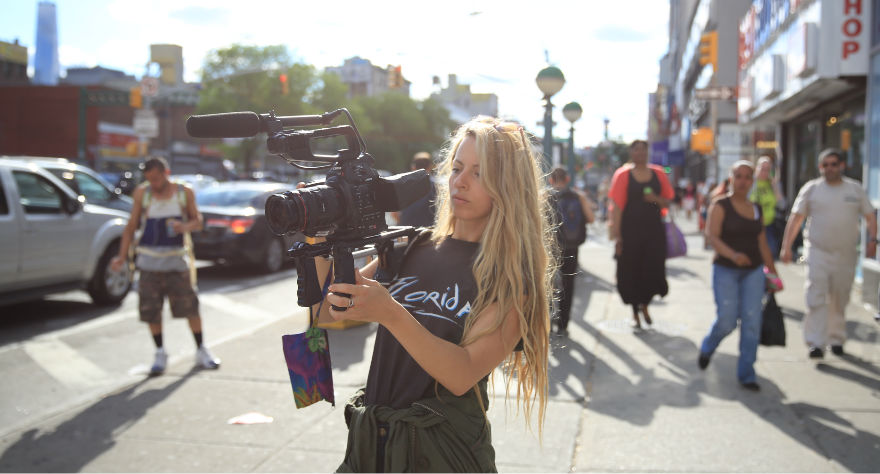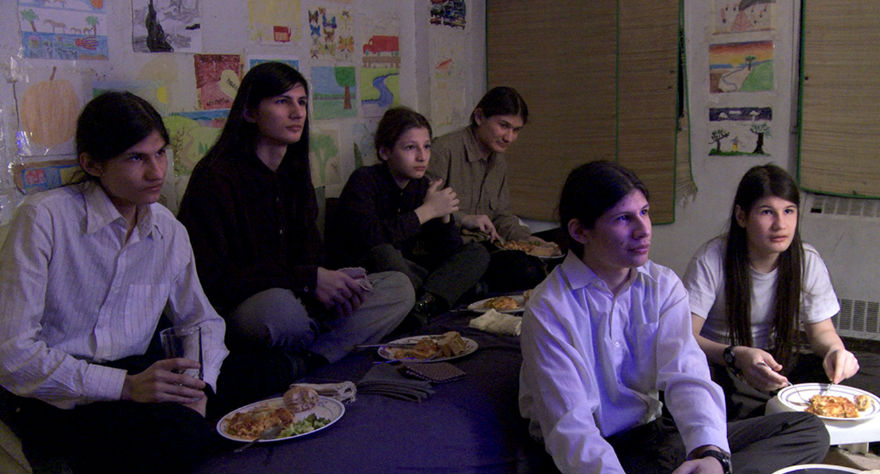Crystal Moselle Talks ‘The Wolfpack,’ the Virtue of Never Growing Up

The Angulo brothers—Mukunda, Narayana, Krisna, Govinda, Bhagavan and Jagadesh—are aspiring filmmakers with a background all their own: they were raised in seclusion in a tiny apartment, forbidden to step foot into the outside world until they were close to adulthood. They devoted their lives to movies, watching Tarantino flicks, reading film books and making their own movies, accruing a wealth of knowledge that has a certain purity to it, considering the fact that they had such limited influence from the outside.
While running wild on the NYC streets in Reservoir Dogs-inspired attire, they had the good fortune of zipping past filmmaker Crystal Moselle, who found their childlike exuberance fascinating. She chased after them on foot and, a few years later, we now have The Wolfpack, a documentary by Moselle about the boys and their remarkable family story. Doesn’t get more lucky than that. The film premiered at Sundance this past January and has not only garnered a ton of attention, but has also launched what will hopefully be a fruitful filmmaking career for the brothers from the Lower East Side.

The story of how you met the boys is pretty amazing. Maybe it’s because I’m not a filmmaker or documentarian, but I feel like nothing that amazing ever happens to me!
I feel like you just have to be open to it. Strange stories seem to follow me. I’m just interested in the bizarre.
Do you search for bizarre stories?
Not at all. They literally run past me and chase them down.
I feel like most people wouldn’t have chased them down like you did.
I’m always street casting and trying to come up with ideas and interesting characters and stuff. I thought they were mesmerizing. I just instinctually wanted to know what was happening. I’ve always been very curious, ever since I was young.
What was your creative outlet when you were young?
I lived in the hills and I was always going on these crazy adventures, getting lost and getting in trouble. I’d create these fantasy worlds. We had these neighbors. There was this blackberry bush between our houses, and we’d tell them that we were fairies. Then we felt guilty and told the truth, that we were just the kids from next door. [laughs]
You seem to still have that same playfulness.
I don’t think I’ll ever grow up. I can’t. My dad’s 62 and still goes dancing three times a week and doesn’t stop the party.
Sometimes you see people older than us who’ve let go of that playfulness, and they’re less happy for it.
It really helps keep you alive.
I feel like the boys will never let that go.
They have a lot of sequestered energy that needs to be let out.
What’s cool to me about the boys is how talented they are at making movies. I made movies with my friends when I was their age, and our movies sucked. The boys’ minds seem to work differently than most other kids, creatively.
They had a lot of practice. If you think about it, all they did on their free time was watch movies. They’d spend two days writing these scripts, and they’d practice and practice and practice. It was more like performance art. They weren’t filming all of the performances; it was really more about becoming these characters and going into these worlds, these movies. The filming stuff came later. At first, it was about building the world. Filming would interrupt all of that. They went for it, like a play. Their audience was each other. Finishing things is hard, a movie, a short film, a painting, whatever. They did, like, 50 different films.
I feel like their minds work so differently because their upbringing is so unique. It can’t really be duplicated, so there really aren’t any other filmmakers like them. I’m excited to see their stuff.
They just sent me a treatment they’re working on. It’s so cool!
Are you going to be involved with their work at all going forward?
They’re starting a Wolfpack Pictures production company, and I’m helping them.
Do you learn stuff about filmmaking being around them?
Yeah! What was cool is that they read so many books about movies, so they’ll tell you about crazy affairs that happened on set and stuff. They know the backstory about films none of us would ever know. They also study directing books. They know the techniques, and now they’re in the process of finding their own voice.
If I were to grow up in the situation they did, I imagine I’d have been pretty scared of the outside world. The boys are the opposite. They’re fearless and curious about everything.
Throughout this process it’s really been about letting go of fear. They had so much fear, but once they realized the monster wasn’t underneath the bed, they got out there and did it. The first thing Mukunda asked me was, “What do you do for a living?” I said, “I’m a filmmaker.” He said, “We’re interested in getting into the business of filmmaking.” He was very serious about it and straightforward and ready to go. When I first met them in the park, they all had little notepads and they were taking notes. They’re very, very passionate and ready to learn.
It goes back to the idea of finishing things; they motivate me to finish things. I had to finish the film for them. When you’re working on a documentary, not only are the subjects in your hands, but you’re doing it together. No matter what, it’s a sort of collaboration. Mukunda gave me a stack of VHS tapes. He said each of them had ten hours of their childhood on it. I was going through a lot of archival stuff. Govinda would go around shooting B-roll of the neighborhood and stuff. It was an interesting process. The boys are so resourceful and resilient.
What was the biggest challenge of structuring the film?
I worked on this for 4 1/2 years with Enat Sidi, who’s the editor. She’s brilliant, and I learned so much from her. The way she cuts is about working with the motion and finding scenes that speak to you. Once you have the scenes cut together, you just start doing this mix-n-match. It took a while to get to the end. It’s so simple, but there are so many ways you can go. And you have to kill your darlings. The movie’s about the family and what they went through and how they’re dealing with their new lives.
Were you scared to film their father?
At first I was kind of scared. I didn’t film the dad for the first two years. He was there, but when I’d come over, he’d leave. Everything flowed in the right way. I asked him to interview eventually, and he was excited about it. He was very kind to me and thanked me for helping his kids. By the time I came into their story, he had been overthrown. There wasn’t anything to be scared of. I had no idea what was happening in the first year or so.
What do you mean?
I was just interested in the kids because they were cool and fun to hang out with. They have this openness that you don’t really see in New York; everybody has this jaded vibe, like they’re too cool. [laughs] It was cool hanging out with them, but I didn’t know about their history. Slowly, it started unraveling and I’d pick up little clues here and there.
My favorite moment in the movie is when they go to the theater and are so stoked that their money is going to Christian Bale and David O. Russell. It made me emotional because I think most of us take for granted how cool going to a movie is. I loved that they were so excited to support the industry.
Being there was really emotional. This is their obsession, and they’ve never gone to a theater.
The Dark Knight scene with the Joker blows everyone away. The acting is so good!
These kids! These kids! Look at them! [laughs] I love that part. It’s so good.
You mentioned killing your darlings.
There was a great scene that was on Tarantino’s birthday that we had to cut. They celebrate it like it’s a holiday. I’ll find another way to bring that in as a DVD extra or something. But you have to go with the narrative.
Tarantino’s a filmmaker people naturally gravitate to because he’s so beloved by everyone. I like that, even though the boys grew up in this bubble, they still gravitated toward Tarantino, without any outside influence.
I know, right! They saw Pulp Fiction on TV and they were like, “Bring us all his movies!”
What are they like at Q&As?
They’re really funny and open and not nervous, like I usually am. I’m getting better at it, but they’re super cool. Krisna’s like, “You know, I’m more into ’80s rock now.” [laughs]
Are they ladies’ men?
I think they’re getting their mojo. They really liked Chloe, the girl in their movie at the end. The idea for that movie was really brilliant. It came from something deeper and had emotion to it. I thought it was pretty cool.
